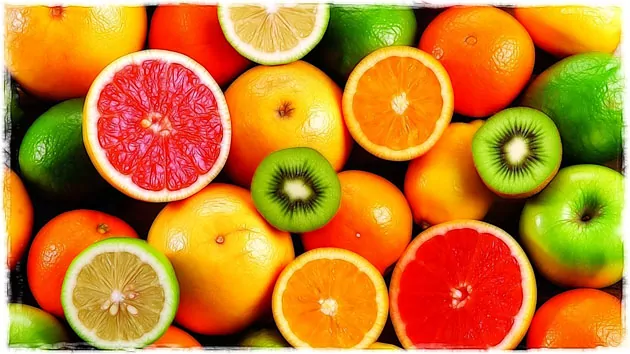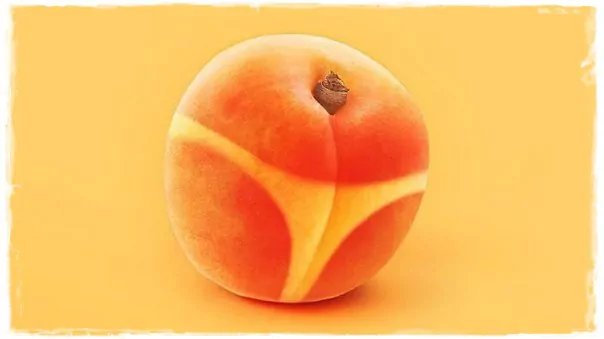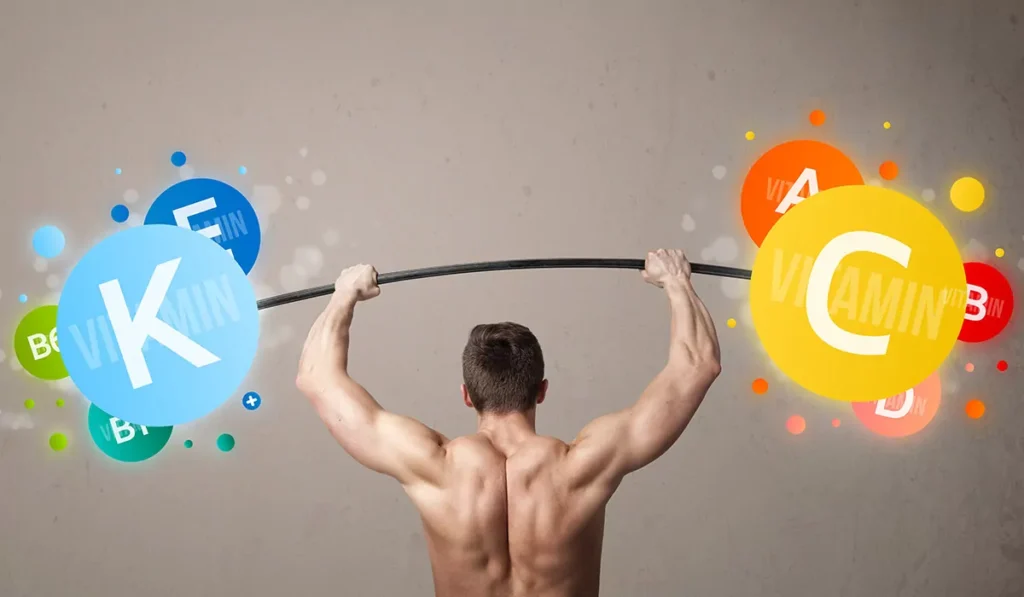Hello! Let’s talk about what vitamins should be taken by everyone who engages in sports, and really, everyone in general.
A Bit of History
In ancient Egypt, it was known that eating liver could prevent night blindness (which can be caused by a deficiency in vitamin A). About 700 years ago, humanity also knew that maintaining health required a combination of various foods.
In the 18th century and earlier, there was a very serious and life-threatening problem, especially among sailors—SCURVY!
When this disease appears, the gums start bleeding, teeth fall out, blood vessels become fragile, limbs ache severely, and immunity drops. Anemia then develops.
Especially on long sea voyages, this inevitably led to death.
This continued until 1747 when Scottish scientist James Lind proposed adding sour foods (initially lemons and limes) to the diet of sick sailors. It turned out that these foods could cure scurvy (which is caused by a deficiency in vitamin C).

Recognition did not come immediately, despite his “Treatise on Scurvy,” but by 1795, the diets of ALL SAILORS included sauerkraut, malt wort, and citrus syrup.
As a result, not a single sailor died from scurvy afterward.
Interestingly, after this, sailors began to be called “limeys,” leading to numerous so-called “lemon riots,” during which sailors threw barrels of citrus syrup and lemon juice overboard.
Although scientists Hopkins and Eijkman received the Nobel Prize in 1929 for the discovery of vitamins, the origins of this discovery can be traced back 50 years earlier to the research of Russian scientist Nikolai Ivanovich Lunin.
He fed test mice all the known components of cow’s milk: sugar, proteins, fats, carbohydrates, and salts. All the mice died afterward.
In September 1880, Lunin concluded that for the survival of an animal, in addition to proteins, carbohydrates, fats, salts, and water, other substances, unknown at that time, were also necessary.
Vitamins
Vitamins (from Latin “vita” — “life”) are a group of low-molecular organic compounds with relatively simple structures and diverse chemical nature.
They are also called “micronutrients” because they are required by the body in extremely small amounts compared to other nutrients (proteins, fats, carbohydrates).
These are essential elements of dietary (and regular) nutrition, most of which the body cannot synthesize on its own.
Multivitamins are pharmacological preparations that contain a complex of vitamins and minerals.
By the way, what is the only natural multivitamin that exists in nature? BREAST MILK! It contains a huge and valuable set of many essential vitamins.
There are two types of vitamins:
- Water-soluble (B vitamins, vitamin C)
- Fat-soluble (Vitamins A, D, E, K)
Fat-soluble vitamins can accumulate in the body, so excessive intake can be toxic.
Water-soluble vitamins are less dangerous when taken in excess, as their surplus can be excreted in urine, with rare exceptions.
In the human body, vitamins typically work as “coenzymes,” meaning they enhance the activity of enzymes involved in many chemical processes, including protein synthesis (the primary process necessary for muscle growth).
In short, you won’t be able to build muscles without consuming the necessary amount of vitamins because your body won’t be able to convert incoming substances (many enzymes cease to function) into the elements that muscles are built from.
This is why many beginner athletes, even with proper training and nutrition, sometimes fail to gain significant muscle mass due to a lack of vitamins in their diet (many enzymes are disabled and cannot direct the incoming substances where they are needed).
Vitamins, despite their diverse chemical structures, can be described as organic substances that must be obtained from external sources in small quantities, as they are either not synthesized at all in the human body or are synthesized insufficiently (such as the formation of nicotinic acid from tryptophan).
An exception is vitamin D, which is synthesized in the body under the influence of ultraviolet radiation.
What Vitamins Should Be in a Bodybuilder’s Diet?
All of them. However, certain vitamins play a crucial role in bodybuilding, and I’ll tell you more about them below.
It’s long been proven that athletes have a significantly increased need for vitamins due to the accelerated metabolic processes!
During training, the demand for vitamins can increase by 1.5-2 times.
The problem is that athletes simply can’t add more fruits and other vitamin sources to their diet, as this would lead to digestive issues. Therefore, every bodybuilder must ensure they are getting enough vitamins by using specialized sports vitamins.
Here are the vitamins that must be included in the diet:
Vitamin C (Ascorbic Acid):
The KING of vitamins for everyone, not just athletes. It promotes protein synthesis, boosts immunity, aids in collagen production, participates in redox processes, and impacts the nervous and endocrine systems. Another very important aspect is that it plays a role in the synthesis of steroid hormones, including testosterone.
- Daily requirement for an average person: 70 mg.
- Daily requirement for athletes:
- During training: 150-200 mg;
- During competitions and 2-3 days after: 200-300 mg.
Found in: rose hips, cauliflower, spinach, sorrel, lemon, green onions, mandarins, etc.
Vitamin B1 (Thiamine):
B1 BUILDS MUSCLES, as this vitamin plays a crucial role in protein, fat, and mineral metabolism. It is directly involved in protein synthesis. Without enough of it, carbohydrates burn out, leading to the accumulation of pyruvic and lactic acids in the body. Thiamine also STIMULATES WORK CAPACITY, helping to endure increased physical and mental stress.
- Daily dose of Vitamin B1 for athletes: 0.7 mg per 1000 kcal of the diet.
Found primarily in plant products: the outer layer of cereal grains, whole grain bread, peanuts, beans, oatmeal, pork and beef kidneys, walnuts, brewer’s yeast, etc.
Vitamin B6 (Pyridoxine)
Plays a crucial role in the intermediary metabolism of amino acids (involved in protein synthesis), the breakdown of glycogen, and the formation of hemoglobin (the main oxygen transporter in the blood). It also aids in protein utilization in the body, so the more protein you consume, the more Vitamin B6 you need.
- Daily requirement for Vitamin B6: 5-10 mg. With increased protein intake, the need for this vitamin increases.
Found in: dried yeast, meat, fish, eggs, legumes, bananas, potatoes, milk, and bread.
Vitamin B5 (Pantothenic Acid)
Participates in biochemical processes such as the oxidation and biosynthesis of fatty acids, the synthesis of citric acid, and the biosynthesis of steroids!!! Fortunately, it can be obtained from almost any plant and animal products.
- Daily dose of Vitamin B5: 15-20 mg.
Found in: kidneys, egg yolk, meat, potatoes, tomatoes, cabbage, buckwheat, oats.
Vitamin H (Biotin)
Plays a vital role in amino acid metabolism and energy production from various sources. This vitamin is essential for a balanced diet. It is involved in the synthesis of protein and fatty acids.
- Daily requirement: 0.3-0.4 mg.
Found in: green peas, egg yolk, beans, cabbage, potatoes, peanuts.
Vitamin D Group (Ergocalciferol, Cholecalciferol)
Their most important function is aiding in the absorption of calcium and phosphorus, which are essential for strong bones. Vitamin D can be synthesized in the body when exposed to sunlight.

Due to the lack of sunlight in the far northern regions, athletes need to supplement with this vitamin at a daily dose of 400-1000 IU.
Found in: Baltic herring liver fat, chicken eggs, milk, and butter.
Vitamin B3
Participates in energy production processes and is crucial for providing muscles with nutrients during workouts.
Found in: turkey meat.
Vitamin E (Tocopherols)
An antioxidant that protects cell membranes from damage. Vitamin E reduces the number of free radicals in the body (one of the causes of aging). Free radicals are byproducts of cellular respiration, and their accumulation leads to the degeneration and damage of cellular structures.
- Daily requirement: 40 mg.
Found in: sunflower oil, legumes, wheat flour, oatmeal, liver, and egg yolk.
Vitamin A (Retinol, Retinoic Acid)
Firstly, it is involved in protein synthesis and bone and skeletal growth. Secondly, it participates in glycogen storage processes (the main “fuel tanks” in muscles and the liver). Thirdly, it is directly linked to photoreception processes (enabling twilight, light, and color vision).
- Daily requirement: 2.5-4.0 mg.
Found in: cow’s milk, 20% fat sour cream, fish oil, beef liver, and chicken eggs.
Vitamin B2 (Riboflavin)
Participates in the biological oxidation of fatty acids and energy production, hematopoiesis, glucose metabolism, and hydrogen assimilation. Riboflavin regulates protein metabolism!
- Daily requirement: 0.8 mg per 1000 kcal.
Found in: meat, fish, eggs, liver, oatmeal, milk, and dairy products.
Vitamin B12 (Cyanocobalamin)
Essential for the synthesis and breakdown of certain amino acids. It regulates carbohydrate metabolism and ensures the vitality of nerve fibers. Stimulates muscles through nerves!!! This is a key factor in the successful execution of any movement.
- Daily dose: 0.004-0.01 mg.
Found in: beef and cod liver, beef, pork, and cod.
All other vitamins should also be obtained from food, but I have listed those without which any sport is simply impossible!
Should You Take a Break from Vitamins?
In the treatment of chronic inflammatory diseases and immune deficiency, for example, extremely high doses of vitamin C (10-15 g/day) may be prescribed. However, such dosages should not be used for longer than a month, as the body adapts to high doses of ascorbic acid and will simply excrete it in the urine.
It’s important to remember: ANY VITAMIN SHOWS MAXIMUM ACTIVITY WITHIN A MONTH, after which the body adapts, and effectiveness sharply decreases!
After a month of taking multivitamins, you should take a break and then resume intake.
You can alternate, for example, a month-long course of vitamins E, C, B12, B5, and then repeat. This way, you’ll spend less money and get the maximum benefit.
However, it’s better to use vitamins together that have a synergistic effect, meaning they enhance each other’s effectiveness, such as:
- B1, B2, B6, and C
- C and P
- B1, B2, and PP
- B12, B6, and C
Additionally, specialized sports complexes that contain a range of vitamins and minerals are also effective.
In quality sports vitamins, technologies are often used that allow for the simultaneous release of synergistic vitamins while delaying others that would reduce the effectiveness of the first ones. This sequential release is very convenient—just take 1-2 capsules and you’re done.
Conclusions
I believe I have thoroughly covered the topic of which vitamins athletes and regular people should take.
Every athlete needs to take vitamins because they help enzymes break down food into the necessary components. Otherwise, a large portion of your diet will simply go to waste. Take your vitamins and stay healthy.

